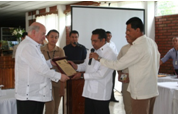
 From left to right: Michael Taylor, Economic and Commercial Counselor of the U.S. Embassy in Honduras; Zenik Krawctschuk, Ambassador of Brazil in Honduras; Juan Orlando Hernández, President of Honduras; José Miguel Insulza, OAS Secretary General, and Redondo Flores Director of the UNA.
From left to right: Michael Taylor, Economic and Commercial Counselor of the U.S. Embassy in Honduras; Zenik Krawctschuk, Ambassador of Brazil in Honduras; Juan Orlando Hernández, President of Honduras; José Miguel Insulza, OAS Secretary General, and Redondo Flores Director of the UNA.
The government of Honduras and the Organization of American States (OAS) launched the first pilot ethanol plant in the country on July 15. The successful completion of this joint initiative represents a turning point in the process of realizing the aspiration of leading the country towards energy sustainability.
Since the Government of Honduras decided to begin the process of expanding its energy matrix through renewable sources, it has received technical support from the OAS-SEDI, as part of the implementation of the agreement between the governments of the U.S. and Brazil to advance regional cooperation on biofuels.
 During the inauguration of the plant at the National Agricultural University (UNA), the President of Honduras, Juan Orlando Hernández, thanked the OAS, “for its great contribution to support energy generation through biofuels, thereby enhancing the country’s energy security, as it is highly dependent on fossil fuels.”
During the inauguration of the plant at the National Agricultural University (UNA), the President of Honduras, Juan Orlando Hernández, thanked the OAS, “for its great contribution to support energy generation through biofuels, thereby enhancing the country’s energy security, as it is highly dependent on fossil fuels.”
In a country like Honduras, which consumes about 5 to 6 million barrels of gasoline each year, it is expected that once commercial production is reached, about 1.2 million barrels of gasoline can be replaced by ethanol each year (24% of annual consumption), thus boosting its energy security. In addition, different studies have demonstrated that the increased use of ethanol has direct benefits for the general population as it does not emit carcinogenic substances and other toxic chemicals and it reduces CO2 emissions. It is estimated that on average, ethanol emits about 50% to 70% less CO2 than gasoline.
During the inauguration of the plant, OAS Secretary General, José Miguel Insulza emphasized that “today we are witnessing something more than the inauguration of a plant, we are witnessing the commitment of a country – and the National Agricultural University – to develop the bases of the design of sustainable policies and regulatory frameworks for the use of biofuels,” he said, adding that “a country that does not have access to energy is a country that cannot satisfy the basic needs of its citizens, such as transportation, nutrition, employment, and economic and social development.”
Other authorities who participated in the inauguration include Zenik Krawctschuk, Ambassador of Brazil in Honduras, and Michael Taylor, Economic and Commercial Counselor of the U.S. Embassy in Honduras, and other national and international authorities.
 Ruben Contreras, Expert Engineer on Energy and Climate Change from the Department of Sustainable Development at the OAS-SEDI, told local media that “the plant has the capacity to produce 295 liters of ethanol every eight hours and works with input from sugarcane grown by small farmers in the area Catamacas, Olancho.” Thus, beyond the benefits related to energy security and health, the plant also creates new opportunities for the economic growth and social inclusion of local communities.
Ruben Contreras, Expert Engineer on Energy and Climate Change from the Department of Sustainable Development at the OAS-SEDI, told local media that “the plant has the capacity to produce 295 liters of ethanol every eight hours and works with input from sugarcane grown by small farmers in the area Catamacas, Olancho.” Thus, beyond the benefits related to energy security and health, the plant also creates new opportunities for the economic growth and social inclusion of local communities.
“The OAS was a key element in realizing the construction of the ethanol plant, partnering the organization’s know-how on sustainable development with our company’s global experience,” said Roberto Gutierrez, Executive Director of De Lorenzo – Engineering Training Solutions, the Brazilian company that built the plant.
The importance of a pilot plant like the one in Honduras lies in its real potential to be scaled up to commercial production in the short term. Together, the recent change in legislation on biofuels – a process that was also accompanied by the OAS, the transfer of technology necessary for its production, and the participation of UNA in the training of new engineers and technicians, provides the basis for generating a transformative and durable impact.
 Recognition from the University that hosts the Plant Recognition from the University that hosts the Plant
During the opening ceremony, the National Agricultural University (UNA), acknowledged the support of the government of Honduras, the Organization of American States (OAS) and the governments of the U.S. and Brazil, with a plaque of recognition. |
This article was originally published by the Executive Secretariat for Integral Development (SEDI) of the Organization of American States (OAS), here.
 View Map
View Map